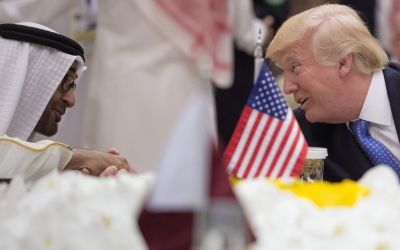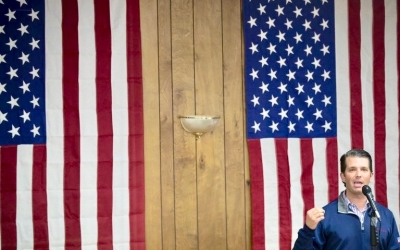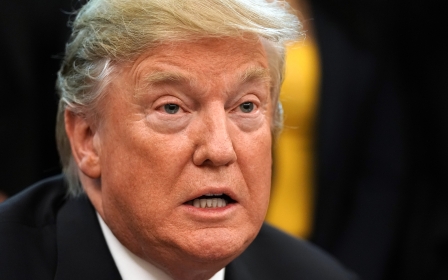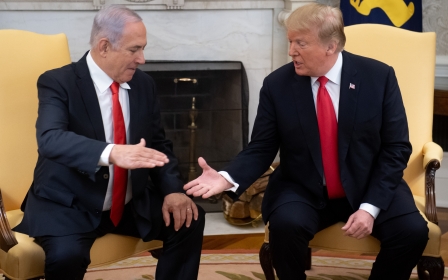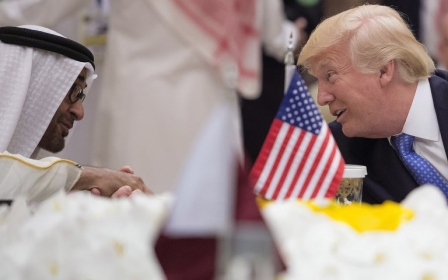Saudi rentals at Trump World Tower raise conflict-of-interest concerns: Report

The US State Department has allowed at least seven foreign countries, including Kuwait, Iraq and Saudi Arabia, to rent luxury condominiums at a property owned by US President Donald Trump, Reuters news agency reported.
The rentals were authorised without approval from Congress, the news agency said on Thursday, citing documents and people familiar with the leases.
That raises concerns that the rental agreements may violate the US Constitution's emoluments clause, which prohibits federal employees from receiving gifts or payments from foreign governments without first getting permission from Congress, Reuters said.
The foreign governments in 2017 rented units at Trump World Tower in New York, according to documents and interviews collected by Reuters.
In the eight months after Trump's inauguration in 2017, foreign governments sent 13 requests to the State Department seeking permission to rent or renew leases in Trump World Tower, the news agency said.
Of those 13 requests, Iraq, Kuwait, Malaysia, Saudi Arabia, Slovakia, Thailand and the European Union were given go-aheads from the State Department, renting a combined eight units at the Trump-owned property.
When contacted by Reuters, Slovakia said its lease was legal, while Malaysia said it wasn't renting in the building anymore.
"All the other governments that sought to rent units after Trump's inauguration declined to comment or did not respond to requests for comment," the news agency said.
Mohammad Alkadi, a spokesman for the Saudi Mission to the United Nations, told Reuters that Trump World Tower's location near UN headquarters in New York was the reason Saudi Arabia decided to rent the units.
Alkadi dismissed the idea that the rental was part of an effort to curry favour with the Trump administration, which has been a staunch defender of Riyadh in the face of mounting criticism over its human rights record.
Trump has defended Saudi Arabia despite a conclusion from the CIA late last year that powerful Saudi Crown Prince Mohammed bin Salman ordered the killing of Saudi dissident and journalist Jamal Khashoggi.
The US president also recently vetoed a hard-fought, bipartisan bill in Congress that would have ended American involvement in the Saudi-led war in Yemen.
"The governments pay for these units in the building not to get favours from Trump or anything, but just because it's very convenient and comfortable for us," Alkadi told the news agency, about Saudi Arabia's decision to rent condos at Trump World Tower.
Alkadi also told Reuters that he moved into his own unit in the building at the end of 2017.
'Serious questions'
But according to the news agency, the Trump administration never got permission from Congress for the rentals to Saudi Arabia and the other foreign governments.
The Trump building in question is controlled by a limited partnership, which is owned by Trump and managed by the Trump Corporation.
'This new information raises serious questions about the president and his businesses' potential receipt of payments from foreign governments'
- US Congressman Elijah Cummings
The Trump Corporation garners income from fees paid by unit owners, according to financial records obtained by Reuters.
In 2017, Trump earned more than $15m in fees collected by various Trump Corporation-managed properties, Reuters said.
After being informed of the dealings, Democratic Congressman Elijah Cummings, chairman of the House Oversight and Reform Committee, called for "transparency".
He said his committee has been "stonewalled" in its attempt to gather information about foreign government payments to Trump's businesses.
"This new information raises serious questions about the president and his businesses' potential receipt of payments from foreign governments," he told the news agency in a statement. "The American public deserves full transparency."
Ongoing litigation
Trump is already being sued by 200 Democrats in Congress for alleged violations of the emoluments clause, in relation to other properties.
Trump's attorneys have argued that the Constitution only requires him to get permission from Congress if foreign emoluments are offered in connection with his role as president.
While Trump still owns his businesses, his oldest sons and a longtime company executive are running the companies while he is president.
On Tuesday, a US federal judge denied Trump's motion to dismiss one of the two ongoing emoluments lawsuits against him, stating in a 48-page opinion that Trump's definition of emoluments was "unpersuasive and inconsistent".
Trump is also being sued under the emoluments clause by the attorney generals of Washington, DC and Maryland.
In July, a federal judge in Maryland ruled that a lawsuit against the president over Trump Hotel DC's acceptance of payments from foreign governments could go forward.
The judge found that even though Trump does not "actively manage" the hotel, he "continues to own and purportedly controls" it, and "actually or potentially shares in the revenues".
Since his campaign began, Trump has been open about some of his business dealings with foreign governments - including Saudi Arabia.
"Saudi Arabia - and I get along great with all of them. They buy apartments from me," Trump said at a campaign rally on 21 August 2015. "They spend $40m, $50m. Am I supposed to dislike them? I like them very much."
In June 2001, Trump sold the entire 45th floor of Trump World Tower to the Kingdom of Saudi Arabia, according to multiple reports. The apartments were converted in 2008 into part of the Saudi Mission to the UN.
Middle East Eye delivers independent and unrivalled coverage and analysis of the Middle East, North Africa and beyond. To learn more about republishing this content and the associated fees, please fill out this form. More about MEE can be found here.


